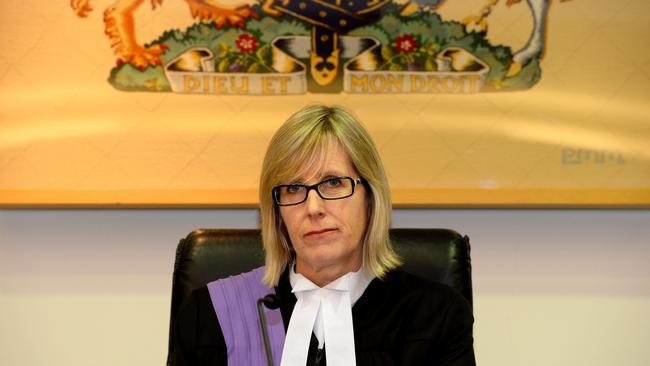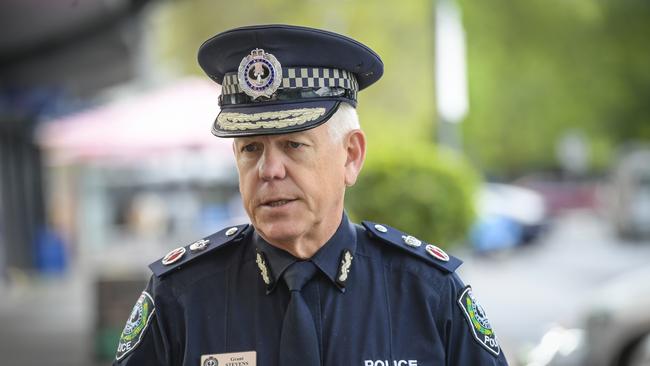Detective Brevet Sergeant Craig Metschke and Detective Sergeant Darrin Widdrington reported to Office for Public Integrity after ‘unlawful conduct’ finding
Two senior detectives are facing possible disciplinary action after a judge found they created a “false narrative” to cover up “unlawful police conduct”.
Police & Courts
Don't miss out on the headlines from Police & Courts. Followed categories will be added to My News.
Charges against a man allegedly connected to a major drug syndicate and facing life in jail if convicted were dropped after a judge found two senior detectives – now facing disciplinary action – unlawfully searched his car and created a “false narrative” in their notes to cover up “unlawful police conduct”.
In a scathing indictment of the then-Serious and Organised Crime Branch officers’ conduct, more than 1kg of methamphetamine found in the man’s car was excluded from evidence, forcing prosecutors to drop a major trafficking charge against him almost four years after his arrest.
Detective Brevet Sergeant Craig Metschke and Detective Sergeant Darrin Widdrington’s conduct has been reported to the Office for Public Integrity after District Court Judge Jane Schammer found they had created a “false narrative” to cover up the illegal search and seizure.
Under the Police Complaints and Discipline Act, the publishing of the details of officers under investigation is prohibited.

But in a rare exception, Police Commissioner Grant Stevens granted The Advertiser an exemption to publish details in Judge Schammer’s ruling, including the names of the detectives facing potential disciplinary action.
In her decision to exclude the drugs from evidence, Judge Schammer said Sergeant Metschke and Sergeant Widdrington created a “false narrative” to give their unlawful conduct “legitimacy”.
Prosecutors withdrew a charge of one count of trafficking in a large commercial quantity of a controlled drug against the man on April 19.
Under the Controlled Substances Act, such an offence carries a maximum penalty of life imprisonment, a fine of $1m, or both.
Sergeant Metschke and Sergeant Widdrington stopped and searched the man’s car on May 20, 2020 after he left a suspected drug dealer’s house, under surveillance as part of an ongoing investigation into a major drug syndicate, and seized 1.04kg of methamphetamine.

However, they were found to have acted outside the law by stopping and searching him under the Controlled Substances Act, at the instruction of other officers, before doing checks relied upon to form their own reasonable suspicion to do so.
The stop was executed under a Tactical Operations Order, which involved a plan to stop a vehicle leaving the Torrens Rd house to determine if a drug deal had taken place.
The house was being surveilled as part of an investigation into a $20m cannabis crop found in Virginia in February 2020.
The man living there was suspected of being involved in cultivating the thousands of plants after his fingerprints were found on a heat-sealed bag at the bust site.

Police intelligence suggested he was part of a drug syndicate also involved in dealing heroin, cocaine and MDMA across Adelaide.
Judge Schammer said the detectives’ conduct only came to light after the man’s lawyer Ben Armstrong insisted police radio communications, showing the necessary checks on the man had been done after he had been stopped, be produced.
Judge Schammer said if the “illegality” was confined to search, she would not have excluded the drugs from evidence.
“However the Court is satisfied that what occurred after this short cut was taken, is that Metschke and Widdrington, both being experienced officers, working within the SOCB, together worked towards creating a false narrative, in order to give the procedure legitimacy, based on what information ultimately came to be known by police about the accused as the investigation unfolded,” Judge Schammer said.
“While I do not doubt that in doing so, both officers honestly considered that the means justified the ends, given what the search had uncovered, this was deliberate conduct, designed to retrospectively cure (or camouflage) what was unlawful police conduct,” Judge Schammer said.

“I am satisfied that the errors in the notes and initial statements made by Metschke and Widdrington are the product of impropriety and not simply a product of human error.”
Judge Schammer said the evidence uncovered “falls short” of establishing more senior Serious and Organised Crime Branch officers knew of or condoned the detectives’ unlawful conduct.
“To condone the unlawful conduct in these circumstances, despite the seriousness of the alleged offending, would amount to an abrogation of the legislature’s safeguard of individual liberties,” she said.
The Office for Public Integrity have not yet made any findings related to the officers.




